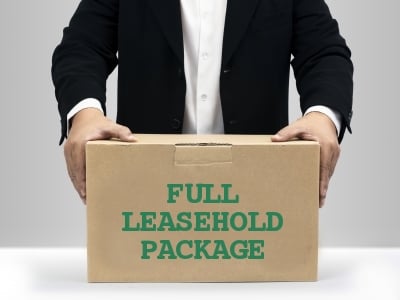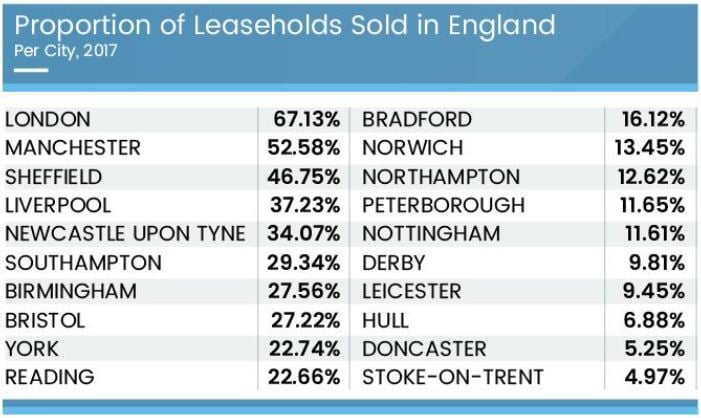
16:32 PM, 15th February 2018, About 7 years ago 1
Text Size
In light of the Government’s crackdown of ‘unfair and abusive practices within the leasehold system’, online housing agents Sellhousefast.uk decided to investigate the sales of leasehold properties in England and Wales.
Sellhousefast.uk analysed data from the Land Registry and found that the leasehold system is very much alive in both England and Wales. Perhaps more alive than ever before.
The main findings of the research include:
Analysis of the Land Registry’s data reveals that leaseholds accounted for 219,511 or 31.9% of all properties sold in England and Wales in 2017. In 2016, leasehold properties accounted for 26.9% of all properties sold. That’s a 1.2% increase from 2015 when leaseholds made up 25.7% of the property market. So instead of decreasing, the sales of leasehold properties have been increasing even though the Government announced to act earlier in 2017.
Sellhousefast.uk found that of 219,511 leaseholds sold in 2017, 184,618 or 84.1% were existing properties and 34,893 or just 15.9% were new-builds. Of all the flats sold in 2017, only 3,312 or 2.13% were freeholds, which means that freehold flats are virtually non-existent.
Alex Highman (47), one of the flat owners in Gemini Park, Borehamwood Hertfordshire, who decided to buy-out their freehold explained his view of the issue:
“If you have a landlord who is cooperative and allows you to change the site and make it better, then buying the freehold is pointless. Of course, once you own the freehold you no longer need to pay ground rent and renewing your lease is far cheaper. It all comes down to a balance of whether it’s worth the cost to those buying.
Due to our purchase of the freehold we can now pursue with the cooperation of everyone on site, as we have chosen to retain the Residents Association, bettering the site and making it a safer happier place to live.”
Sellhousefast.uk looked at the share of leaseholds sold in the largest English cities in 2017 and found major differences. The leasehold system was found to be most widespread in London and Manchester where leaseholds accounted for 67.13% and 52.58% of all properties sold, respectively. Sheffield had the third largest share of leasehold properties – 46.75%, followed by Liverpool (37.23%) and Newcastle upon Tyne (34.07%).
With leaseholds accounting for just 4.97% of all properties sold, Stoke-on-Trent was found to be the freehold capital of England. With leaseholds making up only 5.25% of the total property market, Doncaster closely fell behind Stoke-on-Trent. Doncaster was followed by Hull (6.88%), Leicester (9.45%) and Derby (9.81%).
 A similar situation was observed in Wales, who are still waiting a solution for the leasehold issue. With leaseholds accounting for 35.12% of all properties sold in 2017, Neath was found to have the highest proportion of leasehold properties sold in the country. The Welsh capital of Cardiff had the second highest proportion of leasehold properties (24.32%), followed by Swansea (19.19%), Newport (14.19) and Barry (12.80%).
A similar situation was observed in Wales, who are still waiting a solution for the leasehold issue. With leaseholds accounting for 35.12% of all properties sold in 2017, Neath was found to have the highest proportion of leasehold properties sold in the country. The Welsh capital of Cardiff had the second highest proportion of leasehold properties (24.32%), followed by Swansea (19.19%), Newport (14.19) and Barry (12.80%).
With leaseholds accounting for less than 3% – 2.95%, Merthyr Tydfil was the least “leasehold-affected” city in Wales in 2017, followed by Llanelli (3.84%), Bridgend (5.56%), Wrexham (8.92%) and Cwmbran (10.75%).
Robby Du Toit, MD from Sellhousefast.uk commented:
“We are yet to see how the Government will solve the issue of the existing leaseholders and how the latest measures will affect the property market. I’m afraid that existing leaseholders will probably have to lower the asking price considerably if they want to sell. I can’t imagine who will want to buy a property with preposterous ground rents, especially now that the Government promised to set the ground rents on new long leases – for both flats and houses – to zero.
Another thing that worries me is that a lot of leaseholds are held by investors who obviously want to make the most out of their investment. I’m concerned that they might try to exploit the loop holes in the new measures to continue to profit from the leasehold system.”
Previous Article
Is Section 24 going to end student summer discounts?Next Article
Necessity to disclose suicide in rental property?
Badger
Become a Member
If you login or become a member you can view this members profile, comments, posts and send them messages!
Sign Up14:53 PM, 20th February 2018, About 7 years ago
Could you unpack that last paragraph a bit please?
It is not immediately obvious to me just how investors are able to profit from this situation.